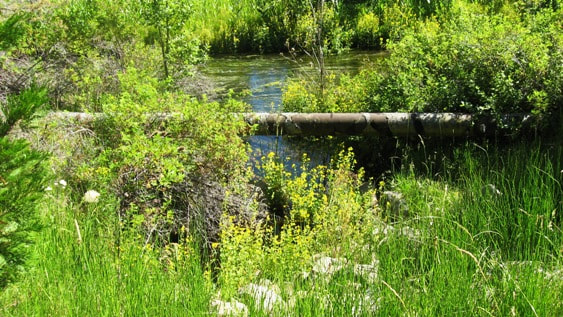

The City of Weed in 2016 determined that the Water Lease Agreement ("WLA") is exempt from CEQA and therefore conducted NO ENVIRONMENTAL REVIEW even though the Water Lease Agreement contains a number of new provisions that pose significant environmental risks, including:
(1) The City’s immediate loss of 25% of the City’s primary water supply (.5 c.f.s.) from Beaughan Springs that the City and its citizens have relied upon for more than one hundred years.
(2) The City’s loss of the remaining 75% of its primary water supply (1.5 c.f.s.) from Beaughan Springs and all rights to Beaughan Springs upon obtaining an alternate water supply or at the end of the lease term.
(3) The requirement that the City develop “new water supplies” to replace the water from Beaughan Springs.
(4) A provision permitting Roseburg to connect to the City’s main sewer line; and
(5) A provision requiring the City to accept Roseburg’s industrial effluent even though Roseburg sits on a U.S. Environmental Protection Agency Superfund Toxic Waste Site.
Plaintiffs ask the Court to set aside the Water Lease Agreement so that the City can conduct an environmental review regarding these historic changes as required under CEQA.
Weed and Mt. Shasta Water Issues
Groundwater extraction for commercial bottling in Weed and Mt. Shasta has received major attention recently. California is in the midst of a major and continuing drought of severe proportions. Pristine gravity-fed groundwater enjoyed by the Weed residents for over 110 years is in question locally. A portion of the water coming from Beaughan Springs on Roseburg Forest Products land has been supplied to the City of Weed and more recently to Crystal Geyser for its bottled water. In 2016 a local citizens' group (Weed Area Water Alliance) ("WAWA") filed a Siskiyou Superior Court lawsuit against Roseburg and the City of Weed alleging violations of CEQA surrounding the new Water Lease Agreement and also unfair business competition. Roseburg has been selling Crystal Geyser Roxane water for over 20 years, one third of which is sent to Japan. Crystal Geyser has stated they want the City’s entire share of waters. The WAWA lawsuit complaint also claims the city owns its 2.0 cfs water rights based upon a recently discovered 1982 letter acknowledging the transfer of these rights from International Paper many years before Roseburg entered the picture and located at Weed.
Meanwhile, the citizens of another group, Water for Citizens of Weed CA ("WCWC") in May, 2017 prevailed in convincing the City Council to support their request of the local Shasta and Scott Valley Watermaster District and the State Water Resources Control Board to investigate the city's water rights. Roseburg immediately filed a SLAPP suit (Strategic Lawsuit Against Public Participation against the both the City of Weed and 9 local citizens. The Weed Nine, represented by an excellent legal team of James Wheaton and Paul Clifford of The First Amendment Project , won their first battle in court on December 7th. The SLAPP suit was dismissed and the citizens' first amendment rights to petition their government by inquiring about water rights was upheld in Siskiyou Superior Court ~once again with Judge Karen Dixon presiding. Roseburg lost this legal battle, but states that it is considering next steps.
MT. SHASTA BOTTLING PLANT
In Mount Shasta two citizen groups and the Winnemem Wintu Tribe filed an Appeal to the Siskiyou County Board of Supervisors over the Planning Commission's November 2017 decision to accept a very flawed EIR on the Crystal Geyser Water Company plant. The Mount Shasta watershed has been the target of major international water bottling corporations since 1996 with Danone Waters followed by Coca Cola and now Crystal Geyser Water Company. On the south side of the mountain near McCloud, Nestle attempted unsuccessfully to place a huge straw into the volcanic aquifer providing water to both the Sacramento River and Shasta Lake (and south (omit)and to the Shasta River north of the mountain.) As usual, little attention has been paid to plastics pollution and impacts on groundwater. One wet year does not spell the end of drought. While many north Siskiyou County residents may not give credence to global warming, the south county residents are well aware of the writing on the wall. Convincing local jurisdictions that water bottling is a dead end resource extractive path is the ongoing challenge.
As anticipated, the Appeal was denied on December 12th. Attorney Marsha Burch filed that Appeal representing the Winnemem Wintu Tribe, and W.A.T.E.R. (We Advocate Thorough Environmental Review) and the Gateway Neighborhood Association. If the City and Crystal Geyser are allowed to proceed with the bottling plant's operation, there would be clearly inadequate protections in the EIR for local wells and aquifers, air quality, traffic and local sewer infrastructure. These citizen groups will be looking into every means to continue to defend the many unresolved issues and work for a legitimate Final EIR.